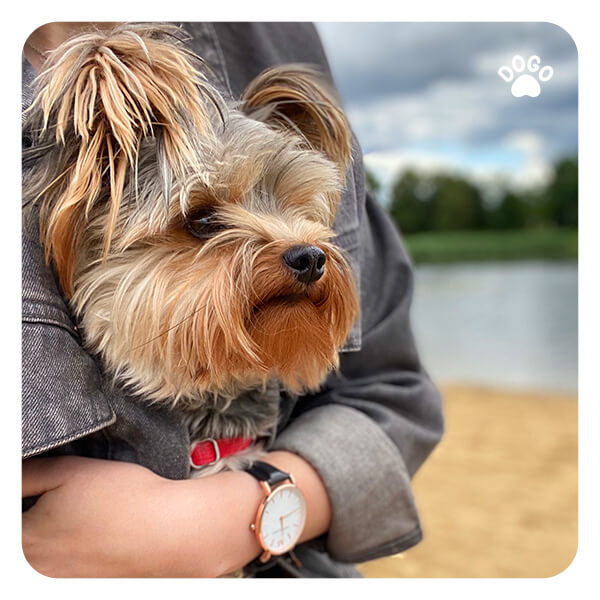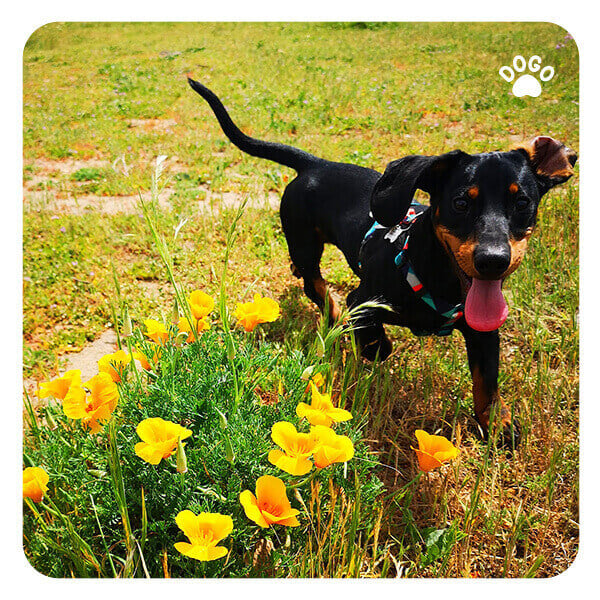My Puppy Is Afraid of Everything – What Should I Do?
Post Date:
July 18, 2024
(Date Last Modified: November 13, 2025)
Many puppies show worry or avoidance when faced with new people, places, sounds, or handling. Recognizing fear early and responding calmly helps keep the puppy safe and makes behavior change easier.
Signs Your Puppy Is Afraid
Fear shows in both body language and behavior; noticing consistent signals lets you respond without escalating the stress. Watch for physical cues like a lowered or crouched posture, ears held back, and a tail tucked close to the body, and for behavioral cues such as freezing, moving away, clinginess, or excessive barking.
- Cowering, crouched posture, or a tucked tail
- Lip licking, yawning, whale eye (showing the whites of the eyes)
- Freezing in place, active avoidance, or following caregivers closely
- Sudden escalation to barking, lunging, or defensive snapping when cornered
Freezing episodes can last from 5 seconds to several minutes depending on the trigger and the dog’s temperament[1].
Common Causes of Puppy Fear
Fearful reactions often come from three broad sources: inherited temperament, early-life experience, and physical or sensory issues. Some puppies are genetically predisposed to be more cautious or reactive, while others develop fears because they missed positive early exposure to people, other dogs, or routine noises. Pain, ear or vision problems, and other medical issues can also reduce tolerance for handling and new situations, so always keep health in mind when evaluating behavior.
When a puppy has had abrupt or frightening experiences during the first months of life—such as rough handling, loud chaotic environments, or limited human contact—those memories can set up avoidance patterns that generalize to similar contexts later on.
Developmental Stages & Temperament
Puppy learning and fear are highly age-dependent; the primary socialization window runs roughly from 3 to 14 weeks of age[1], and interactions during that time have an outsized influence on what a puppy views as normal and safe. A juvenile fear period commonly appears around 8–11 weeks and can reoccur at 4–6 months, when previously confident puppies suddenly resist new things[1].
Breed tendencies influence sensitivity: some breeds are described as more reactive or vigilant, but individual variation within a litter is common. Early temperament testing and gentle, varied exposures during the socialization window reduce the risk that normal caution becomes persistent anxiety.
When Fear Is Normal vs Concerning
Transient, situation‑specific fear that resolves with distance, time, or a calm caregiver is expected in young dogs and can be addressed at home. Concerning signs include persistent avoidance of normal activities (refusing to eat or eliminate in the home), escalating aggressive responses when approached, or self‑injury such as compulsive chewing or persistent trembling.
If a puppy’s fear prevents routine care, interferes with eating or toileting, or causes frequent defensive snapping when handled, plan a veterinary check and a structured behavior plan rather than waiting for spontaneous improvement.
Immediate Calming Strategies
When a puppy is visibly frightened, the immediate goal is to reduce arousal and prevent escalation. Remain calm and move slowly; avoid forcing eye contact or physical contact, and never punish fearful behavior. Create a quiet, predictable space where the puppy can retreat with familiar bedding, toys, and access to water. Short, consistent routines for feeding, sleeping, and play reduce overall anxiety by providing predictability.
Temporary, noninvasive tools can help reduce acute stress—pressure wraps, pheromone diffusers, and gentle white‑noise or low‑volume music are commonly used as adjuncts—but they should be paired with behavior change rather than relied on alone. Use of calming aids is intended as short‑term support while you implement gradual training and desensitization.
Desensitization & Counterconditioning Plan
Change happens when you alter the puppy’s emotional response to a trigger by making the trigger predictable, nonthreatening, and reliably followed by something the puppy values. Build a graded exposure hierarchy from the least to the most scary version of the stimulus, pair each step with high‑value rewards, and proceed only when the puppy shows relaxed or neutral behavior at the current level.
Begin training with very short, frequent sessions to keep the puppy engaged and avoid fatigue; aim for sessions of 5–10 minutes, 2–3 times per day when starting a formal desensitization program[2]. Track progress with simple measures such as approach distance, duration of relaxed posture, and the number of stress signals emitted per exposure.
| Step | Intensity / Distance | Reward | Session length |
|---|---|---|---|
| 1 — Far and quiet | Room away / visual only | High‑value treats | 5–10 minutes |
| 2 — Distant, audible | In same room, soft sound | Play + small treats | 5–10 minutes |
| 3 — Near, low intensity | Closer, reduced motion | Large reward, praise | 5–10 minutes |
| 4 — Full exposure | Typical real‑world interaction | Varied rewards, short games | 5–10 minutes |
Safe Socialization & Gentle Exposure
Socialization should be controlled, positive, and paced to the puppy’s comfort. Start with very low‑intensity, predictable meetings and gradually increase novelty and complexity as the puppy shows relaxed responses. Keep initial group interactions to very small numbers so the puppy can process new social inputs without being overwhelmed; typically limit introductions to no more than 3 unfamiliar dogs and 1–2 new people at a time[3].
Use distance and predictability to maintain a positive association: allow the puppy to choose whether to approach, have trusted handlers present, and pair every neutral or positive encounter with high‑value treats and calm praise. For sounds, start at a very low volume and gradually increase exposure over days to weeks while monitoring stress signals.
Training Techniques to Build Confidence
Training that emphasizes choice, clear rules, and small successes builds competence and reduces anxiety. Use reward‑based methods such as targeting, shaping, and short impulse‑control games that let the puppy solve simple problems and earn predictable reinforcement. Begin with 1–3 easy tasks per session and increase complexity slowly as the puppy demonstrates consistent success[4].
Enrichment activities—puzzle feeders, scent games, supervised free play, and structured chew time—provide mental stimulation and can lower baseline anxiety by giving the puppy predictable outlets for natural behaviors. Keep practice sessions brief and fun so the puppy learns that training is safe and rewarding.
When to Get Professional Help
If the puppy’s fear is severe, persistent, or interferes with essential functions, seek veterinary and behaviorist support. A veterinary examination rules out pain, sensory deficits, or medical conditions that can cause or worsen anxiety; if a puppy stops eating for 48 hours or loses more than 10% of body weight, arrange an evaluation promptly[5].
For behavior specialists, choose force‑free, credentialed professionals such as certified force‑free trainers or a veterinary behaviorist for complex cases. Some dogs benefit from medication or structured intensive behavior modification when anxiety is severe; medication decisions should be made in consultation with a veterinarian or veterinary behaviorist and used alongside a behavior plan, not as a standalone fix.
Practical, phased program you can follow
Begin with short, predictable sessions and build both the puppy’s tolerance and your confidence as handler. Plan 2–3 short sessions per day when introducing a new stimulus, keeping each session to about 5–10 minutes to avoid fatigue and prevent sensitization[2].
For the first 7 days, work exclusively at a distance where the puppy shows no more than one mild stress signal per minute and pair every calm glance or approach with high‑value rewards; measure distance in feet and keep the puppy at least 10–20 feet away from the trigger if needed during these initial sessions[4].
After the puppy is relaxed at that distance for 3–5 sessions in a row, reduce the distance in small increments of roughly 25% each step and only proceed when the puppy remains relaxed for 2 consecutive sessions at the current level to avoid moving too quickly[4].
Expect measurable change over weeks rather than days; many structured programs track a target such as a 50% reduction in observable stress signals within 4 weeks of consistent work, with ongoing improvement thereafter[1].
Monitoring progress and simple records
Keep a daily log noting session date, duration in minutes, maximum proximity in feet, and a stress‑signal count to quantify progress; reviewing entries weekly helps identify trends and adjust pacing[2].
If the puppy makes no measurable progress after 4–6 weeks of consistent, correctly paced work, that lack of response is a cue to consult a veterinary behaviorist or qualified trainer for a revised plan[5].
Vaccination, socialization timing, and safe exposures
Core vaccines for most puppies are given as a series and are commonly completed by about 16 weeks of age, so plan public outings with disease risk in mind while still providing safe, low‑risk socialization at home and controlled meetings with fully vaccinated, healthy dogs and adults[3].
Before full vaccination, prioritize safe exposures such as handling exercises, sound habituation played at low volume, and visits with known healthy dogs in private homes or controlled environments rather than busy public parks; aim for multiple brief exposures per day rather than lengthy single events to build positive experience without health risk[3].
Practical safety rules for handlers
Always give the puppy space to retreat; a safe handler rule is to maintain at least one escape route and never corner a fearful puppy, and to stop a session before the puppy emits repeated stress signals or shows escalation such as growling or snap attempts[1].
Limit introductions to low numbers of unfamiliar individuals initially—no more than 3 unfamiliar dogs or 2 unfamiliar people per session—to reduce sensory overload and improve the likelihood of a positive outcome[3].
Medication and clinical support: what to expect
When fear is severe or interferes with care, a veterinarian may recommend a medical adjunct; medication trials are typically evaluated over 8–12 weeks with reassessment visits every 4–6 weeks to measure functional improvement and side effects[5].
Medical support is most effective when combined with a behavior modification program and clear goals; medication may lower arousal enough to allow desensitization but is rarely a sole solution for learned fears[1].
Longer‑term expectations and preventing relapse
With consistent, correctly paced work, many puppies show meaningful improvement within 4–8 weeks and continued gains over several months, but some anxiety patterns take 6–12 months of ongoing reinforcement and occasional booster sessions to become stable habits[4].
Maintain occasional low‑intensity exposures after improvement to prevent regression—for example, schedule a brief controlled exposure every 1–2 weeks once the puppy is reliably comfortable to reinforce the learning without overwhelming the animal[2].
Final safety reminders
Never use aversive methods such as punishment, shock, or forced proximity; these approaches commonly increase fear and can produce aggression, which raises the risk of biting and injury to people and other animals[1].
When in doubt about safety, medical causes, or a lack of progress, schedule a veterinary exam and consult a certified, force‑free trainer or veterinary behaviorist to create a coordinated plan that matches the puppy’s needs and family context[5].




